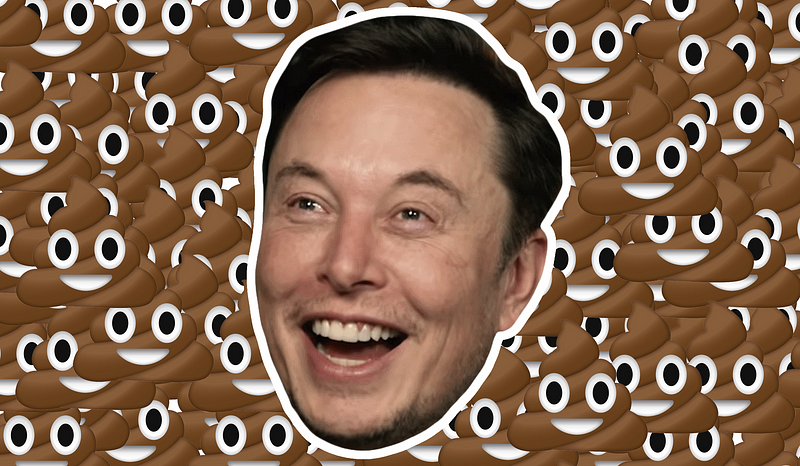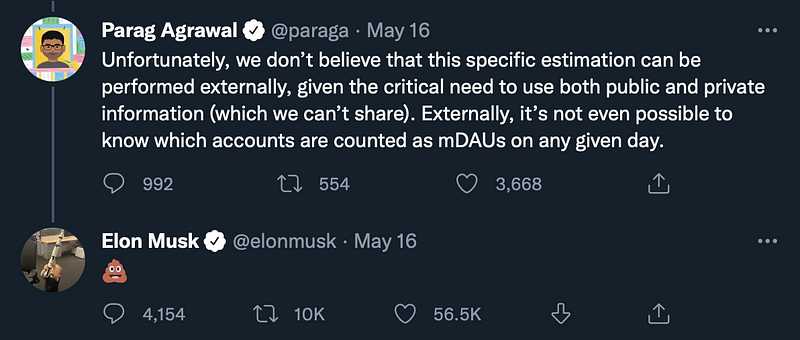Elon Musk, the Poop Emoji, and the Twitter Sale Saga
Written on
The Curious Case of the Poop Emoji
In a bizarre twist, I find myself discussing the poop emoji for the second time this year. This isn’t merely a humorous nod to product marketing; rather, it highlights a billionaire's antics that have left many—himself included—looking foolish.
Since the announcement of Elon Musk’s acquisition of Twitter at $54.20 per share on April 25, the situation has spiraled into a theatrical farce. This drama, unfolding in a so-called “public town square,” features a cast of characters—clowns and antagonists alike—each attempting to outwit one another with a barrage of tweets. Unfortunately, the true protagonists of this saga—the employees striving to maintain normalcy or those resigning in protest of Musk's reckless behavior—have been relegated to minor roles, overshadowed by the chaos. Clearly, Musk is the star of this disastrous performance.
From the outset, the environment has been tumultuous.
Insults have been hurled at existing management and staff, particularly targeting Twitter’s legal chief, Vijaya Gadde, whom Musk accused of enforcing a perceived liberal bias. This led to a wave of harassment against Gadde, filled with sexist and racist remarks from Musk's loyal followers (or trolls). His tweet directly violated a clause in the acquisition agreement that prevented him from disparaging the company or its representatives. One rule for everyone else, but a different one for the affluent, it seems.
Musk has been vocal about “free speech,” despite his tendency to tweet impulsively without repercussions. Recall the infamous “Pedo guy” tweet or his remarks regarding Bernie Sanders. There have been numerous tweets and memes about leftist propaganda, despite Twitter’s own research indicating that right-leaning content is more frequently amplified on the platform.
Last week, CEO Parag Agrawal dismissed two respected executives, prompting questions about the rationale behind such actions from a "lame-duck CEO." Agrawal cited the future of Twitter as a justification, even as three other executives hastily exited the company.
However, nothing prepared us for the grand finale, where Musk dropped a bombshell in the form of a poop emoji regarding the deal.
On May 16, Agrawal sought to clarify concerns about spam and bot accounts on Twitter after doubts arose about their actual numbers. He provided a thoughtful overview of how the company monitors and counts these accounts, likely presenting accurate information. In response, Musk showcased his maturity with equally profound insights.

The following day, Musk declared that unless Agrawal could prove the number of bots and spam accounts was below 5%, “this deal cannot proceed.”
This raises an important question: Is it genuinely about the bots?
The answer is no.
For someone whose ego thrives on public attention, the removal of bot accounts would likely see his follower count plummet faster than Tesla's stock post-Twitter deal. Moreover, the 5% figure is not new; Twitter has disclosed this estimate for years. Musk chose not to conduct due diligence before agreeing to purchase Twitter, signing off on the terms with full knowledge of the data. Even if it could be proven that the 5% figure is accurate, it would likely change little. As Matt Levine insightfully noted in Bloomberg,
“Twitter could get all 229 million of its monetizable daily active users in a room and have them say, ‘Hello Elon, we are real,’ and that would not convince him, because he does not want to be convinced. He wants to pay a lower price.”
This leads to the logical conclusion regarding Musk's antics. He aims to acquire the company for a reduced price that reflects the current market decline. Given that it would cost Musk $1 billion to withdraw from the deal, it’s understandable that he would seek to negotiate a lower price. In the three weeks since the announcement, tech stocks have continued to plummet, and Twitter's stock price has dropped to $38.32—a nearly 30% decrease from the agreed sale price (and 47.75% down from its 52-week high).

Whether a price reduction is feasible remains debatable. According to the terms of the deal, it shouldn’t be possible. However, when a tech company is floundering and in dire need of guidance, and the wealthiest individual in the world is threatening to walk away, there’s a strong possibility that the Twitter board will be open to renegotiation.
Is this the best move for Twitter? Probably not. But what is? Personally, I’d love to see them kick Musk off the platform as a petty act of revenge—but that’s unlikely to happen.
To borrow from Levine once more, “arguably Twitter’s best option is to do nothing. The basic problem with Musk, for Twitter, is that he changes his mind a lot. Maybe he’ll change it again.” Essentially, Twitter’s optimal strategy may be to hope that this is the last we see of the poop emoji and that Musk ultimately commits to purchasing the company at the originally agreed price. Meanwhile, for the public, investors, platform users, and employees—all weary of Musk's omnipresence—we can only wish for the curtains to close on this entire debacle.
Chapter 2: The Poop Emoji Controversy
In this video titled "Elon Musk Bans Comedy On Twitter Over Hurt Feelings," the discussion revolves around Musk's controversial stance on humor on the platform and the broader implications for free speech.
Chapter 3: Musk's Emoji Antics
The video "💩 Elon Musk sending poop emojis to the press!!" humorously explores Musk's use of emojis in communications with the media, showcasing his unique approach to public relations.